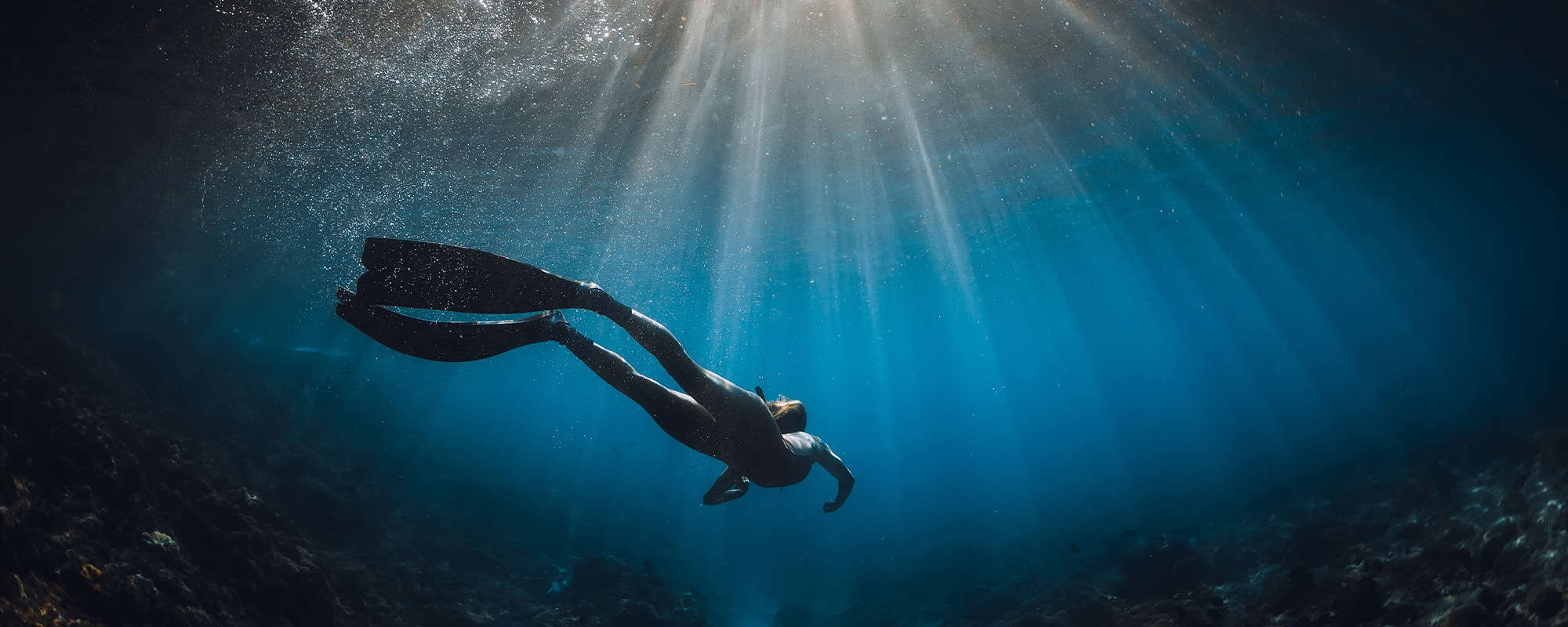As an athlete, Adam Sellars knows and has had to handle the pressure that comes from competition. Just like you, his struggles, aren’t limited to his sporting experience, coping with the pressures of everyday life can be tough, and at one point, Adam shares, it even threatened to cripple and derail his life.
Freediving opened Adam’s eyes to a new way of living and managing pressure and stresses that come with sport, work, and everyday life. Wanting to help others break free from the shackles of pressure, he started The Pressure Project and shares his knowledge and strategies with businesses, teams and individuals. The Pressure Project’s mission is to help release participants from self-defeating thought patterns, unlock their full potential, reach their goals, and live a full and happy life.
Below, Adam shares how you can release yourself from pressure and improve your relationship with your mind. Don’t worry, you don’t have to get your feet wet to do it.
Deep in the ocean, on one breath, the pressure compressing your body, you descend into the big blue expansive sea not knowing what lies beneath. What do you find? Ultimate peace, ultimate enjoyment, suspended in time, a presence you’ve never known, all whilst not having access to the number one thing we human’s need to survive… oxygen.
How? … you might ask! Why?… you might ask. What are you talking about?
Freediving! The fascinating but very misunderstood sport/recreation demands a calm mind, and your ability to control your emotional state and change the relationship you have with your thoughts.
There is no room for stress or anxiety before, or during a dive. Wouldn’t it be great if we had this same approach to life on land? The great news is, is that all the methodologies from freediving can be transferred across to life on land.
Freediving, unlike any other sport, ignites a primal fear that if not controlled and harnessed can lead to poor outcomes. These self-defeating thoughts can be seen in many areas of our life and are unfortunately part of the human condition. Small incidental pressures pile up and then manifest in the form of stress, which, in turn, can result in sickness, mental illness, and poor outcomes in life.
We live in a world where we seem to be in a constant state of worry and fear – of life events or circumstances in the future. Things, that quite often have not happened and may not happen – send our mind and body into our ‘fight and flight’ mode, which is damaging to both our mental and physical health and if left unchecked can have devastating effects.
Freediving is something that can spark that primal response triggering strong survival messages which means we enter our sympathetic nervous system which speeds up our heart rate, inhibits digestion, suppresses our immune system and basically redirects all energy to major muscle groups so that we can run like hell from a threat. In this case – our brain just wants to keep us alive, but in the case of Freediving it has the opposite effect to what we desire.
In Freediving the optimal system is the Parasympathetic nervous system, (rest, digest, and regenerate system), where the heart rate is low and the human body is at peace, operating well, and still. This is where the meditation world meets the underwater world. What we know is that the nervous system can affect the quality of our breath, but conversely – changing the way you breathe can shift your nervous system.
How do we do that? It’s as simple as 3 – 5 minutes of using a breathing technique that Freedivers have been using for a very long time the moments before leaving the surface, and pioneered before them by the Yogi’s.
Firstly, find a space where you can sit either on the floor cross-legged or on a chair with palms facing up in your lap. Then close your eyes – which is significant as it tells the brain that wherever you are, you are safe. Breath through your nose – as air that passes through the nasal cavity produces nitric oxide which improves blood flow around the body. Belly breathe with this process and try to lengthen your exhale on the way out.
When you put all of these techniques together the vagus nerve is stimulated which is responsible for shifting you to your parasympathetic nervous system – calming the mind, and regulating your system. The great news is that the more you do this – the better you get at calming your mind and body, so when you get these self-defeating thoughts you can use your breath as a way of centering yourself.
Practicing this will, over time, train your brain to react differently to thoughts that have previously derailed you and kept you from living a full and vibrant life – because your new pattern is to stop, sit, breathe, and control your emotional state before moving on. Over time – less and less of those negative thoughts appear because you no longer react from a place of fear or anxiety.
Regular meditation practice is essential in our fast-paced, busy world. In meditation, start with your breath and every time your mind wanders – bring it back to your breath, and if the thoughts are not ideal – just observe them, acknowledge them, thank the brain for that thought, come back to breath and know that you are not your thoughts! Your brain is always trying to play devil’s advocate to keep us from harm but that also keeps us in a state of stress and a prisoner within our own head.
For courses and more information visit The Pressure Project
Interested in a course? The Pressure Project is running a Ribbon Reefs Freediving Retreat from October 28 – November 2! Explore the immaculate Ribbon Reefs that stretch over 120km. This stunning area is home to impressive biodiversity and is one of Sir David Attenborough’s favourite places in the world. Imagine waking up on the ocean with gorgeous surroundings learning new skills, reaching new depths and swimming amongst 1625 different species of fish! Find out more and book at www.thepressureproject.com.au





